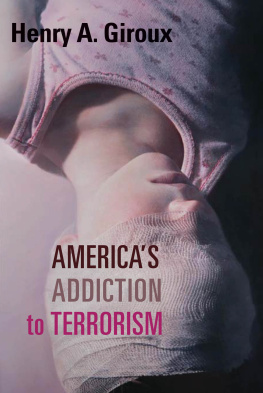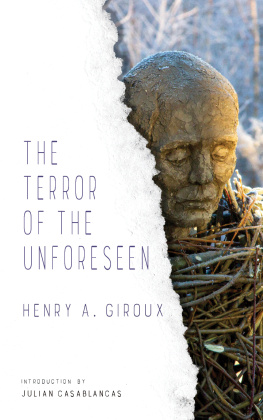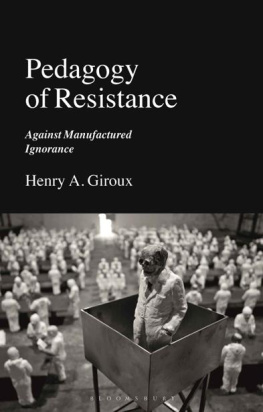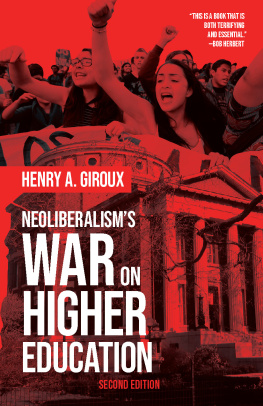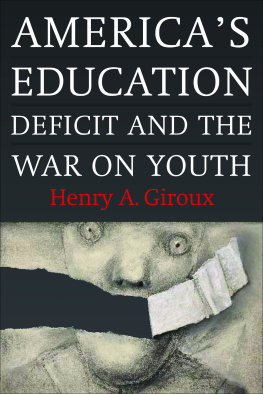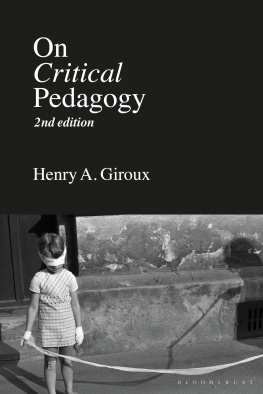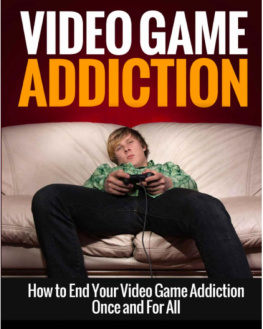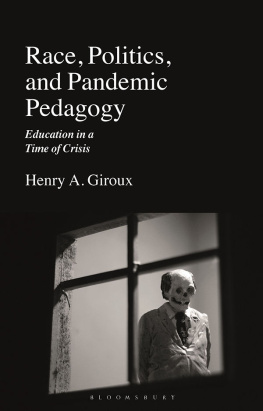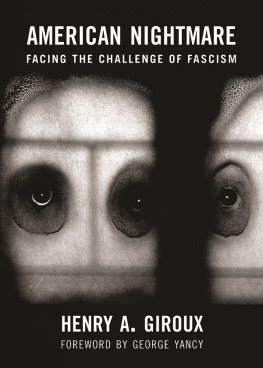Foreword
HENRY GIROUX IS A PHENOMENON. He has written more than sixty books, authored hundreds of essays, won numerous awards, and been an outstanding teacher for nearly forty years. His influence on the field of critical pedagogy is without parallel, and he has made significant contributions to many other areas as well, including both cultural and media studies.
What distinguishes Girouxs writing is a combination of lucid analysis and incisive and justifiably harsh criticism of the deterioration of the human condition under the onslaught of a savage modern-day capitalism. However, his examination of this savagery does not stop with a description of the vicious attacks on working people by corporations and their allies in government. Nor is it content to enumerate the economic, political, and social consequences of these assaults, such as the rise in poverty, stagnating wages, unconscionably high unemployment, deteriorating health, the astonishing increase in the prison population, and a general increase in material insecurity, to name a few. Instead, he goes beyond these to interrogate the more subtle but no less devastating effects of neoliberal capitalism, and by implication capitalism itself, on our psyches and on our capacity to resist our growing immiseration.
In this book, he uses his consummate skills to examine what he terms Americas addiction to terrorism. As he makes clear in these essays, especially , Racism, Violence, and Militarized Terror in the Age of Disposability and The Fire This Time: Black Youth and the Spectacle of Post-Racial Violence), terrorism is as American as apple pie. This nation was founded upon terrorism, namely that of slavery, whose unspeakable degradations hardly ended with formal emancipation. Jim Crow, the Ku Klux Klan, thousands of lynchings, mass imprisonment, and an orgy of police torture and murder have tormented the lives of black men and women right up to the present day. Black men, women, and children became the nations torture template, and what has happened to them set the stage for that directed at workers who dared defy their employers and to the peoples of the world as the United States rained misery down on its many enemies, reaching its apogee but by no means its end with the atomic bombing of Hiroshima and Nagasaki (see the chapter titled Hiroshima, Intellectuals, and the Crisis of Terrorism). Giroux excoriates all of this terror, as well its contemporary raw, naked, and ever-more diabolical forms: drone strikes, waterboarding, renditions, rape, presidential kill lists, and all of the horrors documented in the recent U.S. Senate Committee Study of the Central Intelligence Agencys Detention and Interrogation Program.
To the casual observer, the fact that the Senate report has generated very little public outcry, no prosecutions, and indeed brought forth an out-pouring of rancid and angry justifications by the fascist Bush administration officials who sanctioned the torture the Senate report detailed seems unbelievable. However, as Giroux explains in his Introduction, The Neoliberalism Reign of Terror, the turn away from even a moderate social welfare state represented by the neoliberalism begun in the mid-1970s after the end of the postSecond World War era of rapid economic growth has first gradually and then rapidly and radically changed the political and ideological landscapes.
In the wake of falling profits and the perception by businesses that labor was too strong, corporations launched an all-out attack on workers, marked most ominously by Ronald Reagans firing of air traffic controllers. Along with the assault on the working class, employers demanded and soon won an end to regulations on businesses, especially banks and other financial institutions, as well as the freeing of capital to move around the globe without political impediments. Soon manufacturing began a long decline, hollowing out hundreds of communities once dependent upon it, creating vast wastelands of empty streets, boarded-up houses, and destroyed local economies. The impact on racial minorities was especially devastating. The changes wrought by neoliberal capitalism weakened the strength of labor and raised significantly the degree of economic insecurity faced by those not already financially secure. This, in turn, greatly strengthened the power of those who controlled the economys commanding heights, which today are dominated by financial capital. The inevitable result has been an unprecedented flow of money to those at the very top of the distributions of income and wealth. We are witnessing a new Gilded Age, with unimaginably wealthy people able to buy whatever they want and do whatever they please, the rest of us be damned.
Given that wealth is power and given that the newly minted billionaires desire nothing more than to increase both their wealth and power, and given these two facts, the super-rich will try by whatever means possible to destroy any impediments to their desires. We see all around us the fruits of their efforts. Nearly all of life, every aspect of it from birth to death, has been commodified, and every public service either eliminated or made subservient to the profit motive.
When we say that the powerful will exercise their financial supremacy to secure still more wealth, we should be clear exactly what we mean. Austerity, by which, to put it bluntly, the rich take from the poor, requires the threat of, and under certain circumstances, the use of force. Giroux makes a telling point when he states in Death-Dealing Politics in the Age of Extreme Violence that neoliberalism is itself a form of terrorism. Here he focuses on what he calls our war on young people, who are among the primary casualties of neoliberalism:
The pernicious effects of neoliberal policies... amount to an act of domestic terrorism in light of the suffering such policies and practices impose on children in the United States. Rampant poverty, senseless levels of inequality, lack of adequate health services, racially and economically segregated schools, the rise of the prison state, a crippling minimum wage, police violence directed against poor minority youth, the return of debtors prisons, a generation of young people burdened by excessive debt, and the attack on public and higher education only scratch the surface of the effects of what might be called a culture of war aimed at children.


